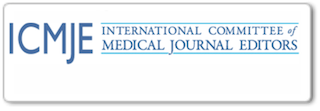The Relationship Between Self Efficacy and Family Support With Hypertension Treatment Adherence of Elderly
Abstract
Hypertension is a degenerative disease that increasing in its prevalence. Hypertension requires a long enough time to its treatment, even if there are no symptoms the patients should continue taking medication. So, patients need to obey to take medication. Adherence to taking medication correlated with self-efficacy and family support. This research aims to determine the relationship between self-efficacy and family support in hypertension treatment adherence of the elderly at Widasari Health Center, Indramayu Regency. The research design is a cross-sectional study. The sample of this research was 78 elderly. The data analysis used univariate to explain independent variables such as self-efficacy and family support, the dependent variable is hypertension treatment adherence, while the bivariate was used to determine the relationship between independent variables and the dependent variable. Dependent variable using the chi-square statistical test. The result of this research showed that 61.5% of the elderly had high self-efficacy criteria, 71.8% of the elderly received their family support, and 60.3% of the elderly obey to hypertension treatment adherence. The chi-square statistical test showed that there was a relationship between self-efficacy and family support with hypertension treatment adherence and also there is a relationship between self-efficacy and the level of adherence to taking medication in people with hypertension. It is recommended to increase the elderly self-efficacy by being able to communicate with fellow elderly who are undergoing hypertension treatment and now have reduced symptoms due to treatment adherence. Nurses should be able to provide health promotion about the importance of self-efficacy and family support in increasing compliance for the elderly undergoing hypertension treatment.
Keywords
Full Text:
PDFReferences
Anwar, K., & Masnina, R. (2019). hubungan kepatuhan minum obat antihipertensi dengan tekanan darah pada lansia penderita hipertensi di wilayah kerja Puskesmas Air Putih Samarinda. Borneo Studies and Research, 1(1), 494–501.
Ariesti, E. (2018). Self efficacy, Kepatuhan, Hubungan Self Efficacy Dengan Tingkat Kepatuhan Pengobatan Hipertensi Di Puskesmas Bareng Kota Malang. Jurnal Keperawatan Malang, 3(1), 39–44.
Benson, H., Rosner, B. A., Marzetta, B. R., & Klemchuk, H. M. (2017). Decreased blood-pressure in pharmacologically treated hypertensive patients who regularly elicited the relaxation response. Meditation: Classic and Contemporary Perspectives, 123–129.
Darmawati, I., & Dulgani, D. (2019). Perawatan Diri Lansia Hipertensi Di Kelurahan Cirejag Karawang. Jurnal Keperawatan Komprehensif (Comprehensive Nursing Journal), 5(1), 1–9.
Darmawati, I., & Kurniawan, F. A. (2021). Hubungan antara grade hipertensi dengan tingkat kemandirian lansia dalam activities of daily living (ADLs). Faletehan Health Journal, 8(01), 31–35.
Darmawati, I., Purnama, H., & Lindayani, L. (2019). Skrining Cognitive Impairment Pada Pasien Hipertensi Di Bandung: Screening Cognitive Impairment in Hypertensive Patients in Bandung. Jurnal Ilmiah Keperawatan (Scientific Journal of Nursing), 5(2), 114–120.
Daziah, E., & Rahayu, S. (2020). Hubungan antara dukungan keluarga dengan perilaku perawatan hipertensi yang dilakukan oleh keluarga di rumah. Dinamika Kesehatan: Jurnal Kebidanan Dan Keperawatan, 11(1), 79–88.
Dewi, A. R., Wiyono, J., & Candrawati, E. (2018). Hubungan dukungan keluarga dengan kepatuhan berobat pada pasien penderita hipertensi di Puskesmas Dau Kabupaten Malang. Nursing News: Jurnal Ilmiah Keperawatan, 3(1).459-469.
Isdairi, M., Anwar, H., Si, S. M., & Sihaloho, N. T. P. (2021). Kepatuhan Masyarakat Dalam Penerapan Social Distancing Di Masa Pandemi Covid-19. Scopindo Media Pustaka.1-20.
Kemenkes, R. I. (2018). Laporan Nasional Riskesdas 2018. Jakarta: Kemenkes RI, 154–166.
Massa, K., & Manafe, L. A. (2021). Kepatuhan Minum Obat Hipertensi Pada Lansia. Sam Ratulangi Journal of Public Health, 2(2), 46–52.
Michishita, R., Matsuda, T., Kawakami, S., Tanaka, S., Kiyonaga, A., Tanaka, H., Morito, N., & Higaki, Y. (2017a). Hypertension and hyperglycemia and the combination thereof enhances the incidence of chronic kidney disease (CKD) in middle-aged and older males. Clinical and Experimental Hypertension, 39(7), 645–654.
Michishita, R., Matsuda, T., Kawakami, S., Tanaka, S., Kiyonaga, A., Tanaka, H., Morito, N., & Higaki, Y. (2017b). Hypertension and hyperglycemia and the combination thereof enhances the incidence of chronic kidney disease (CKD) in middle-aged and older males. Clinical and Experimental Hypertension, 39(7), 645–654.
Phuchum, P., & Darmawati, I. (2022). The Effectiveness of Benson’s Relaxation Therapy on Sleep Quality in Hemodialysis Patient: A Narrative Literature Review. Jurnal Pendidikan Keperawatan Indonesia, 8(1), 48–54.
Purnawinadi, I. G., Lintang, I. J., & others. (2020). Hubungan dukungan keluarga dengan kepatuhan minum obat pasien hipertensi. Jurnal Skolastik Keperawatan, 6(1), 35–41.
Puspita, T., Rismawan, D., & others. (2019). Hubungan Efikasi Diri dengan Kepatuhan Diet pada Penderita Hipertensi. Jurnal Kesehatan Indra Husada, 7(1), 32-41.
Qodir, A. (2021). Hubungan Self-Efficacy dengan Tingkat Kepatuhan Minum Obat pada Penderita Hipertensi. Media Husada Journal of Nursing Science, 2(1), 13–21.
DOI: https://doi.org/10.17509/jpki.v9i1.59455
Refbacks
- There are currently no refbacks.
Jurnal Pendidikan Keperawatan Indonesia(JPKI) published by Indonesia University of Education. JPKI is licensed under a Creative Commons Attribution-ShareAlike 4.0 International License.
Office :
Nursing Department. FPOK UPI.
229, Dr. Setiabudhi Street. Bandung 40154
West Java , Indonesia
E-mail : jpki@upi.edu

_.png)
_.png)
_.png)











